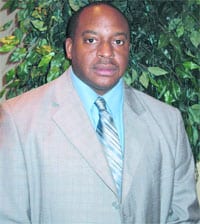Not Too Young Jerome Irving Shares His Wake-up Call with Others
Jerome Irving admits he had some risk factors for a stroke. But in his 40s, he wasn’t nearly old enough … right?
“I have high blood pressure, and I definitely wasn’t eating right or getting proper rest,” said Irving, who was also dealing with the stress of a career change, from a job with a child care agency to a third-shift position as a machine operator, when his stroke hit last September.
“I was with my son at a restaurant, and we were paying for our food, when I just dropped,” Irving said. “I remember lying on the ground, and I could see him and other people standing over me talking, but I couldn’t hear what they were saying to me. I couldn’t move, and when they tried to pick me up, I was frozen; I couldn’t do anything.”
Irving then blacked out and doesn’t remember the ambulance ride to the hospital. Once he did wake, the left side of his body was numb and sluggish, his mouth was droopy, and his speech was slurred, but after a few days the physical effects of the stroke had begun to diminish.
Still, he said, “for about two months after that, my speech wasn’t the same, and I couldn’t remember things.”
Irving remembers plenty today — and passes it on to others. Specifically, he has become an ambassador of the American Heart Association’s Power to End Stroke program, and speaks to those in the Springfield community (at barbershops, churches, community centers, and other places) about stroke risks, and the dangers of ignoring them — at any age.
“The people on my job couldn’t believe I’d had a stroke,” he said. “I couldn’t believe it myself. I was a little overweight, but I thought I was fairly healthy, and I felt fine.”
Doctors told Irving to exercise, get proper rest, work on losing a few pounds, and make sure he stays on medication to treat his high blood pressure. But after such a terrifying experience, he doesn’t need much further prodding.
“You always think it’s going to happen to someone else,” he said. “But it can happen to anyone.”


